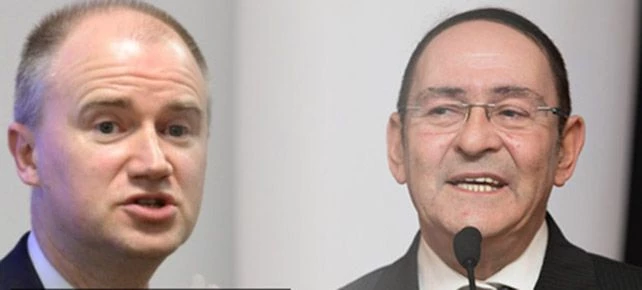
Partner Article
Chief executives of Leeds and Manchester Councils call for a new ‘constitutional settlement’ for the North
Following on from our piece on how regional devolution will be managed, we attended a passionate Downtown event in Leeds last week with the chief executives of Leeds and Manchester city councils.
There, Tom Riordan and Sir Howard Bernstein called for major changes to the “bust” Westminster model of Government in order for the North to realise its full economic potential.
In front of an invited audience of senior business figures, the leaders of both cities confirmed that in light of the Scottish Independence referendum, conversations to deliver the new deal had “already started.”
It was just one of the key talking points from the event, which saw both men speaking frankly about their desire for a new approach to regional and local government, transport and infrastructure and the labour market.
On the current model of government, which he called “archaic”, Sir Howard, the chief executive of Manchester City Council, said: “A whole industry has developed down in Whitehall that is based on managing the minutia of how we live in the regions. We can’t even close a footpath or a road without having to go to central Government.
“We’ve had over 20 years of deep distrust of local government, but effective local government is the only show in town when it comes to delivering.”
Tom Riordan, chief executive of Leeds City Council, was keen to add that attitudes toward the North needed to change generally; “There is always a perception that economic help in the north is to help fight decline and that is wrong. It’s been a catalyst to get our act together to make a success of it.”
The restructuring of Merseyside, Manchester and West and South Yorkshire to end the “municipal terrorism” of the late 80s and 90s, was felt to be decisive in enabling the conversations that are now taking place.
Howard added: “We had to rethink our entire attitude to the labour market in Manchester. In doing so 10 local authorities realised they could achieve a lot more working together than they ever could apart.
“Where we had key hubs of wealth creation we had to give local people access to that wealth, to turn high dependence into independence.”
That spirit of collaboration and change in attitudes was echoed by the chief executive of Leeds, when it came to the traditional rivalries across the Pennines; “Of course we have rivalries, but when we speak to the core cities in the south they remark on how we refer to ourselves as the ‘Northern Cities’. We are collaborating where it makes sense to do so.
“Rivalries are healthy and we don’t want to lose that.”
Transport and infrastructure under the ‘One North’ banner was another area of focus and collaboration.
“Across the north we have missing pieces of a jigsaw from Merseyside and its new freight terminal which isn’t connected to the road or rail network to the docks in Hull which are equally poorly connected. Nobody in their right mind would plan transport in that way.
“Over the next 10 to 15 years we will need to prioritise a series of interventions that will include rail, road and water, and we need to think about them together. The Department of Transport will face a challenging time as it’s not equipped to think like that.”
Tom Riordan added: “Spending on transport is 15 times higher per head in London than in the regions. We don’t want to stop spending in London but we do want to redress the balance.
“The centre of Manchester to Leeds is 37 miles, that’s the same length as the Central Line. If you start to think about travelling across the Pennines as from one end of the Central Line to the other, you begin to see that journey very differently.”
Frank McKenna, chief executive of Downtown in Business, concluded: “It was fantastic to hear the two leaders speak so passionately about devolution, in light of the Scottish vote, and what it will mean for the North.
“It’s clear that there is a huge amount of common ground and thinking and that there will be a significant push for increased power in the regions. Whilst Whitehall will undoubtedly be preparing to push back there could well be the momentum to facilitate change in the very near future.”
This was posted in Bdaily's Members' News section by Aberfield Communications .
Enjoy the read? Get Bdaily delivered.
Sign up to receive our popular Yorkshire & The Humber morning email for free.








 Raising the bar to boost North East growth
Raising the bar to boost North East growth
 Navigating the messy middle of business growth
Navigating the messy middle of business growth
 We must make it easier to hire young people
We must make it easier to hire young people
 Why community-based care is key to NHS' future
Why community-based care is key to NHS' future
 Culture, confidence and creativity in the North East
Culture, confidence and creativity in the North East
 Putting in the groundwork to boost skills
Putting in the groundwork to boost skills
 £100,000 milestone drives forward STEM work
£100,000 milestone drives forward STEM work
 Restoring confidence for the economic road ahead
Restoring confidence for the economic road ahead
 Ready to scale? Buy-and-build offers opportunity
Ready to scale? Buy-and-build offers opportunity
 When will our regional economy grow?
When will our regional economy grow?
 Creating a thriving North East construction sector
Creating a thriving North East construction sector
 Why investors are still backing the North East
Why investors are still backing the North East